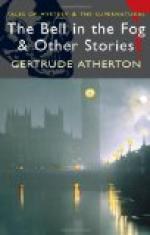With the help of his secretary, he ransacked the library, and finally brought to light the gallery catalogue which had been named in the inventory. He discovered that his children were the Viscount Tancred and the Lady Blanche Mortlake, son and daughter of the second Earl of Teignmouth. Little wiser than before, he sat down at once and wrote to the present earl, asking for some account of the lives of the children. He awaited the answer with more restlessness than he usually permitted himself, and took long walks, ostentatiously avoiding the gallery.
“I believe those youngsters have obsessed me,” he thought, more than once. “They certainly are beautiful enough, and the last time I looked at them in that waning light they were fairly alive. Would that they were, and scampering about this park.”
Lord Teignmouth, who was intensely grateful to him, answered promptly.
“I am afraid,” he wrote, “that I don’t know much about my ancestors—those who didn’t do something or other; but I have a vague remembrance of having been told by an aunt of mine, who lives on the family traditions—she isn’t married—that the little chap was drowned in the river, and that the little girl died too—I mean when she was a little girl—wasted away, or something—I’m such a beastly idiot about expressing myself, that I wouldn’t dare to write to you at all if you weren’t really great. That is actually all I can tell you, and I am afraid the painter was their only biographer.”
The author was gratified that the girl had died young, but grieved for the boy. Although he had avoided the gallery of late, his practised imagination had evoked from the throngs of history the high-handed and brilliant, surely adventurous career of the third Earl of Teignmouth. He had pondered upon the deep delights of directing such a mind and character, and had caught himself envying the dust that was older still. When he read of the lad’s early death, in spite of his regret that such promise should have come to naught, he admitted to a secret thrill of satisfaction that the boy had so soon ceased to belong to any one. Then he smiled with both sadness and humor.
“What an old fool I am!” he admitted. “I believe I not only wish those children were alive, but that they were my own.”
The frank admission proved fatal. He made straight for the gallery. The boy, after the interval of separation, seemed more spiritedly alive than ever, the little girl to suggest, with her faint appealing smile, that she would like to be taken up and cuddled.
“I must try another way,” he thought, desperately, after that long communion. “I must write them out of me.”




